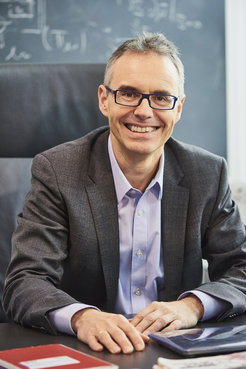Angel Rubio is elected as Leopoldina member
MPSD Director Angel Rubio has been elected as a member of Germany’s National Academy of Sciences, the Leopoldina. His membership will be officially bestowed upon him at a ceremony in Halle in February 2024.
Rubio’s research focuses on the electronic and structural properties of advanced materials, nanostructures and molecular complexes. His work includes the development of theoretical tools to investigate the electronic response of materials and molecules to external electromagnetic fields. In November 2022, he was named as a Highly Cited Researcher.

His work has been recognized by many awards, including the 2018 Max Born Medal and Prize, the 2016 Gold Medal of the Spanish Royal Physical Society, the 2014 Premio Rey Jaime I for basic research, the 2006 DuPont Prize in Nanotechnology, the 2005 Friedrich Wilhelm Bessel Research Award of the Humboldt Foundation, and two European Research Council Advanced Grants. Angel Rubio is a fellow of the APS, EPS and AAAS, a member of the BBAW, the European Academy of Sciences, and the Academia Europaea as well as a foreign associate member of the National Academy of Sciences (USA).
He feels honored to join the many outstanding scientists who make up the Leopoldina’s membership: “It is an absolute privilege to be admitted into the ranks of this historic Academy. I feel truly humbled to see my name listed among those of so many researchers who have made huge contributions to our understanding of the world and the natural sciences.”
The Leopoldina brings together the expertise of around 1,600 distinguished researchers in order to scientifically review and address socially significant issues. Their findings are conveyed to policy makers and the public in Germany and abroad. The Academy was founded in Schweinfurt in 1652, making it the oldest continuously existing academy of natural sciences and medicine in the world. It has appointed more than 7,000 members since its foundation, including Marie Curie, Charles Darwin, Albert Einstein and Max Planck.












